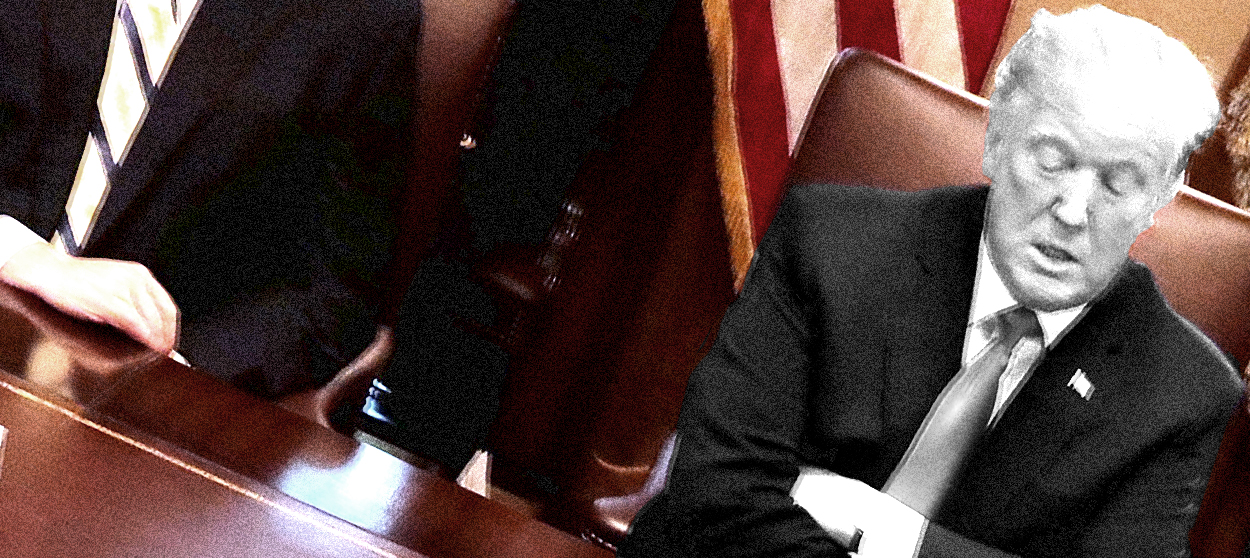Welcome to the Trump Slump
Markets are spooked. Recession fears are growing. Will the president ever learn?


A free daily email with the biggest news stories of the day – and the best features from TheWeek.com
You are now subscribed
Your newsletter sign-up was successful
Perhaps President Trump still thinks trade wars are "good." It's probably a safe bet he does, especially since he's been making this wrongheaded point for decades. But even a lifelong protectionist like the president must feel at least a wisp of doubt that trade wars are "easy to win." Certainly the battered stock market, Trump's preferred economic barometer, is suggesting they're not.
And now the real economy is sending a similar message. Apple has slashed its quarterly revenue forecast for the first time since before it started making iPhones. That shocking downgrade, according to CEO Tim Cook, is in part due to shrinking iPhone demand in China where the economy there is getting pinched by U.S.-China trade tensions. It's a story you're probably going to hear more about in the coming weeks, as even Team Trump is conceding. White House economist Kevin Hassett says, "there are a heck of a lot of U.S. companies that have a lot of sales in China that are basically going to be watching their earnings be downgraded ... until we get a deal with China." Backing up that forecast is the new Institute for Supply Management survey, whose index of national factory activity suffered its biggest drop since the height of the global financial crisis in October 2008. Although the index suggests the economy is still expanding — an important detail — manufacturing executives also said the trade conflict is hurting factory orders.
No surprise really. When the government of the largest national economy in an interconnected global economy intentionally tries to hurt the second largest national economy, there's going to be at least some blowback. Obviously. Or at least it should be obvious. And while strong U.S. economic growth helped offset that blowback for a while, that no longer seems to be the case. At least, Wall Street doesn't expect that to be the case. It's the consensus forecast among big banks that the stimulus-driven Trump boomlet has begun to fade and going forward growth will more resemble the so-so recovery seen after the crisis.
The Week
Escape your echo chamber. Get the facts behind the news, plus analysis from multiple perspectives.

Sign up for The Week's Free Newsletters
From our morning news briefing to a weekly Good News Newsletter, get the best of The Week delivered directly to your inbox.
From our morning news briefing to a weekly Good News Newsletter, get the best of The Week delivered directly to your inbox.
All of which might be an acceptable price to pay for the Trump trade war, except for two things. First, Trump suggested there would be no big price to pay for his "good and easy to win" trade war. Of course American farmers already know that isn't the case. Now Apple shareholders know it, too.
Second, how do Americans evaluate the costs and benefits of the trade war if they don't understand the point of the trade war? No pain, no gain? Sure. But what exactly is the gain supposed to be? Crashing the Chinese economy doesn't mean America gains, although it seems to be pushing Beijing to make a deal with Washington. But it is still unclear what exactly the president wants and how he prioritizes those wants. A smaller bilateral trade deficit? Less technological theft? A change to China's subsidy-driven economic model? That's quite a verifiable action list to have wrapped up by the administration's March deadline.
And how exactly does our trade policy fit in with our broader geopolitical approach to China? For example: If we are somehow trying to gather the world's liberal democracies together in a united front against Chinese predatory capitalism, then Trump withdrawing the U.S. from the Trans-Pacific Partnership was a move in the wrong direction — especially since an 11-nation trade deal to replace the TPP has now taken effect without American participation.
But here we are. And as markets have grown more volatile and business uncertainty has risen, probably so have the odds of a recession. According to JPMorgan models, the probability of a downturn over the next year has more than doubled in recent months to over 40 percent. Meanwhile, the president is tweeting like crazy about The Wall and warning the government shutdown could last for some time. This is another case where even the president's allies are unsure what he would accept as a compromise.
A free daily email with the biggest news stories of the day – and the best features from TheWeek.com
Look, it's been a long economic expansion. And with the Federal Reserve raising interest rates, it doesn't take much to worry investors, business, and consumers. So why does Trump keep giving them so much to worry about?
James Pethokoukis is the DeWitt Wallace Fellow at the American Enterprise Institute where he runs the AEIdeas blog. He has also written for The New York Times, National Review, Commentary, The Weekly Standard, and other places.
-
 Bad Bunny’s Super Bowl: A win for unity
Bad Bunny’s Super Bowl: A win for unityFeature The global superstar's halftime show was a celebration for everyone to enjoy
-
 Book reviews: ‘Bonfire of the Murdochs’ and ‘The Typewriter and the Guillotine’
Book reviews: ‘Bonfire of the Murdochs’ and ‘The Typewriter and the Guillotine’Feature New insights into the Murdoch family’s turmoil and a renowned journalist’s time in pre-World War II Paris
-
 Witkoff and Kushner tackle Ukraine, Iran in Geneva
Witkoff and Kushner tackle Ukraine, Iran in GenevaSpeed Read Steve Witkoff and Jared Kushner held negotiations aimed at securing a nuclear deal with Iran and an end to Russia’s war in Ukraine
